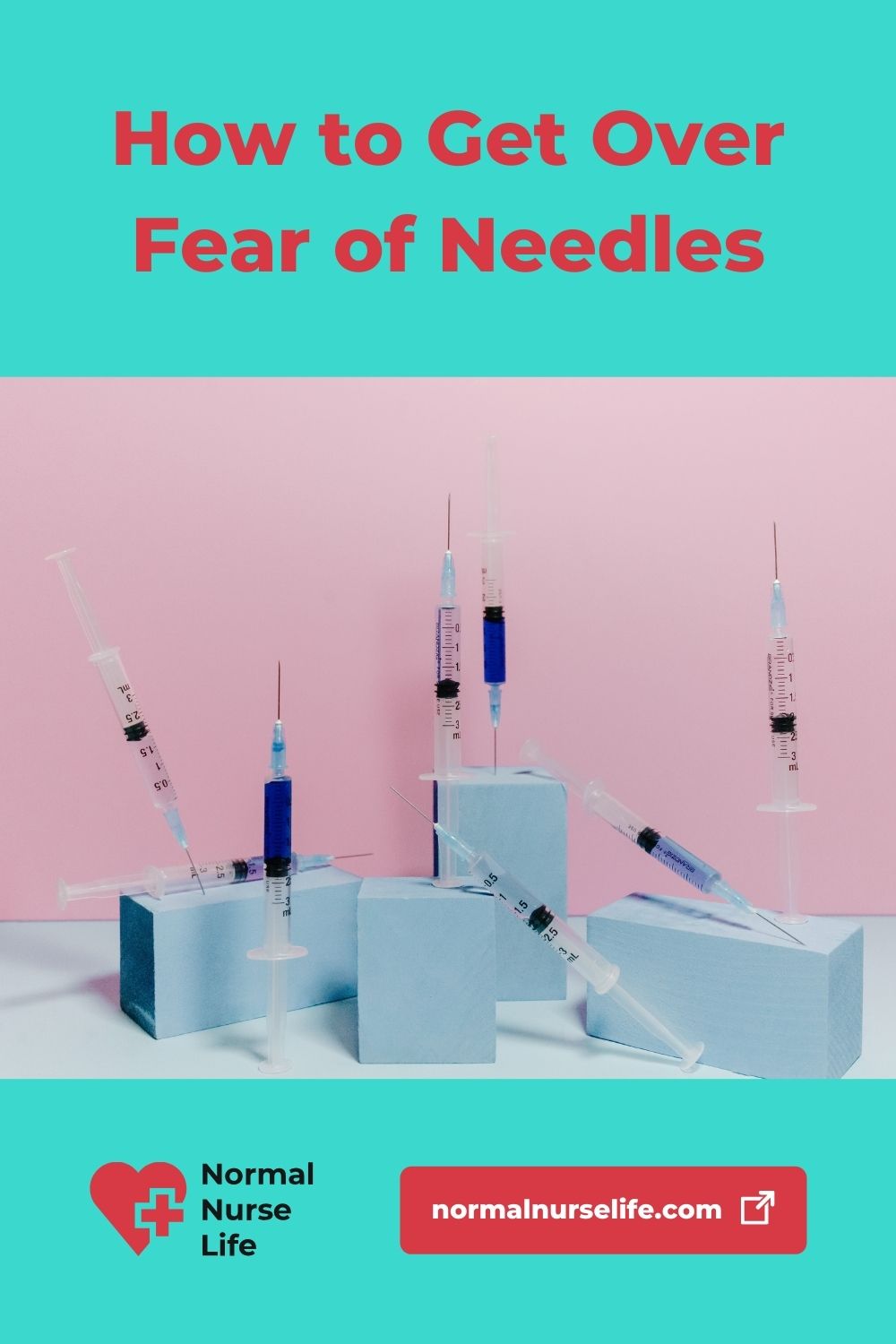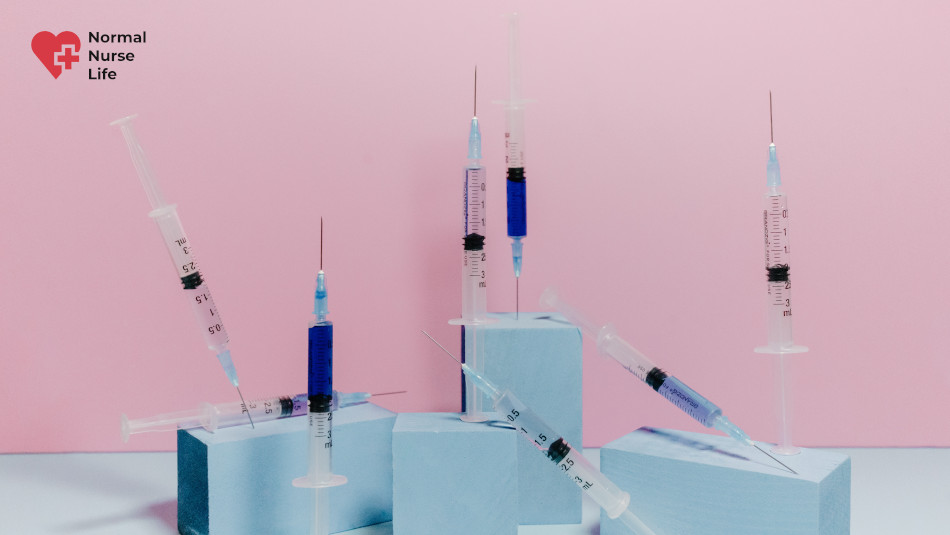It can unarguably be said that injections are the most common invasive procedure in nursing. Most healthcare professionals, including nurses, are said to have some kind of needle phobia or at least fear them.
But as a nurse, you still have to master how to give shots and injections.
In this article, we’ll take a look at how to get over fear of needles as a nurse.
So, what is the fear of needles really, and how does it affect nurses?
Needle phobia, also known as ‘trypanophobia‘ is a term used to describe an extreme fear of needles and shots that some people have.
It is said to have been derived from the Greek words ‘trypa’ which means “hole” and ‘phobia’ meaning “fear”. This phobia can be classified into sharp and blunt needle phobia.
This type of phobia is very common among new nurses, but it is also seen in anyone who has had a bad childhood experience with needles or shots or even watching someone getting injected.
Some people are too afraid to go through an injection procedure, while some are only worried about getting contaminated by the patient’s blood.
This phobia may be disabling for nurses, especially when it comes to giving shots.
See also: Vaccination Nurse Interview Questions
Although most patients are usually not afraid of needles (most of them expect the procedure), there are times when they are uneasy or anxious about the procedure.
If the nurse is afraid of needles, giving shots could be tricky since he/she doesn’t want to hurt the patient.
This could be damaging to one’s career in nursing, especially if you are required to give shots or injections.
Many people are already afraid of needles since childhood, making this phobia worse as time goes by.
However, you can overcome trypanophobia with the help of some techniques.
Pin me on Pinterest!

Table of Contents
Steps on How to Get Over Fear of Needles as a Nurse
Since we have established the fact that most nurses have a needle phobia, it is important to address how you can face this kind of fear.
Keep in mind that if a person is determined to achieve something, he/she can do it.
You just need to know the steps.
Here are some steps on how you can get over your fear of needles.
Step 1: Evaluate the extent of your fear
This is the first step that will help you get over your fear of needles. You should assess how serious your fear is and whether it can cause any problems.
This will also help you determine the best course of action to take.
You don’t want to take big steps if your fear is not that serious. Keep in mind that you’re trying to get rid of it, so help yourself out, too.
To evaluate the fear, you may want to ask yourself these questions:
- How often do I avoid giving injections or any invasive procedure?
- Do my fears hinder me from doing my job as a nurse?
- Am I able to give an injection or procedure if a patient asks for it?
- Do I panic when I need to give an injection or procedure?
- What are the reasons behind my fear?
Answering these questions can help you assess the degree of your fear and how it affects your daily tasks, especially when giving shots or any invasive procedure.
Step 2: Find someone you trust
A lot of people are afraid of needles because they think that their blood will infect the nurse.
You can help yourself by finding a person you trust. Ask this friend or family member to be with you during procedures and injections. He/she can give you moral support and encouragement.
The presence of someone you trust will help calm your nerves, taking away the fear of danger because you feel safe and secure.
Step 3: Learn relaxation techniques
One efficient way to get rid of needle phobia is by learning relaxation techniques.
Relaxation can come in various forms, but some of the most common ways to relax include deep breathing, guided imagery, and progressive muscle relaxation.
Here are some techniques you can learn to help you relax.
Progressive Muscle Relaxation
Progressive muscle relaxation is a way of tensing and relaxing all the muscles in your body.
This is a great technique to use when you are having lunch since it’s not considered multitasking.
Deep Breathing
Deep breathing is a simple way to help you relax.
All you need to do is concentrate on your breaths and let all the thoughts in your mind drift away.
Guided Imagery
When you use guided imagery, you imagine yourself in a relaxing place like at the beach, in a forest, or any place you like.
You can also use guided imagery anytime and anywhere, whether you’re in the office or in front of a patient.
Step 4: Learn about the parts of an injection
You should learn about what different parts of injections are.
The more familiar you are with shots, the less afraid you will be when and if they are required of you.
Knowing the parts of the injection can also help educate patients about the procedure.
This can help create a better bonding moment between you and your patient, especially if they’re also afraid of needles.
Step 5: Observe other nurses giving shots
When it comes to giving injections, you can’t go wrong with observing other nurses.
So before your next injection assignment, ask a coworker to let you watch how he/she does it.
This can also help you learn more about the procedures and devices used, as well as give you an idea of how to deal with anxious patients.
You may also want to ask the nurse if he/she can take you through a ‘dry run’ of the injection.
This will help you get familiarized with the steps involved in giving an injection or any other invasive procedure.
Step 6: Have an injection ‘practice’
Similar to the above, you may also want to take your fear one step at a time by having an injection practice.
This way you will only feel the fear by exposing yourself to smaller tasks.
Injection practices can also help you get more comfortable with giving injections. You will start feeling more confident and secure with your skills and abilities to give shots.
Step 7: Prepare yourself mentally
If you’re still thinking about giving an injection, you should prepare yourself by telling yourself that there’s nothing to fear.
Remind yourself that you have been trained and prepared for this, and there’s nothing to worry about.
Also tell yourself that some people are just more afraid of needles than others, so it’s okay not to be okay initially.
Step 8: Practice self-hypnosis
This may seem like an unusual solution, but it has proven to be effective for many people with needle phobia.
Self-hypnosis can allow you to be in a state of relaxation when facing needles. It gives you the opportunity to reduce the amount of stress and anxiety in your body and even learn to control pain.
Many people who practice self-hypnosis say it’s like they’re watching themselves from afar.
Step 9: Face your fear
You may also want to try some exposure therapy.
All you have to do is repeatedly expose yourself to needles, slowly building up your confidence each time. Exposure therapy can help you slowly get over your fear of needles.
The good thing about exposure therapy is that it can be done anywhere and anytime, whether at work or at home.
As a nurse, you should be able to master exposure therapy since you will constantly come into contact with needles.
Step 10: Get some professional help
If you’re still having trouble facing needles, you may want to seek professional help.
You can talk to your doctor about any fears you have, whether related to needles or not.
The good thing about talking to a professional is that they will help you come up with a solution – and even handle it – so you don’t have to worry.
In most cases, a doctor will either take you through psychotherapy where you will be taught how to face your fears, or prescribe medication for you.
Some medications will include anti-anxiety drugs that will help you deal with your fear.
When a doctor prescribes medication for your fear, it can help you become more confident and comfortable with needles.
So if you’re still having problems facing needles, then you may want to ask your doctor about a prescription.
See also: Can a Nurse Practitioner Prescribe Medication?
The good thing about medications is that they’re temporary, so the effects will slowly go away once you stop taking them.
You will then be able to handle needles and any other fears in your life without the use of medication.
Conclusion: How to Get Over Fear of Needles as a Nurse
Fear of needles is a complex problem for many people because it can be difficult to overcome. The good thing is that this fear has solutions, so you don’t have to experience the fear alone.
Take the above-mentioned steps to find the one that works for you.
If you’re still having trouble overcoming your fear of needles, then seek professional help immediately so you don’t have to experience needle phobia.
Related articles of ours:
- Why Alcohol Swab Before Injection?
- Can Registered Nurse Do Botox?
- Aesthetic Nurse Interview Questions
- Can Nurses Do PDO Threads?
- Do You Need Chemistry For Nursing?
- How Often Do Nurses Check on Patients?
I’d really appreciate it if you could give this article a star rating. Thank you in advance!
